
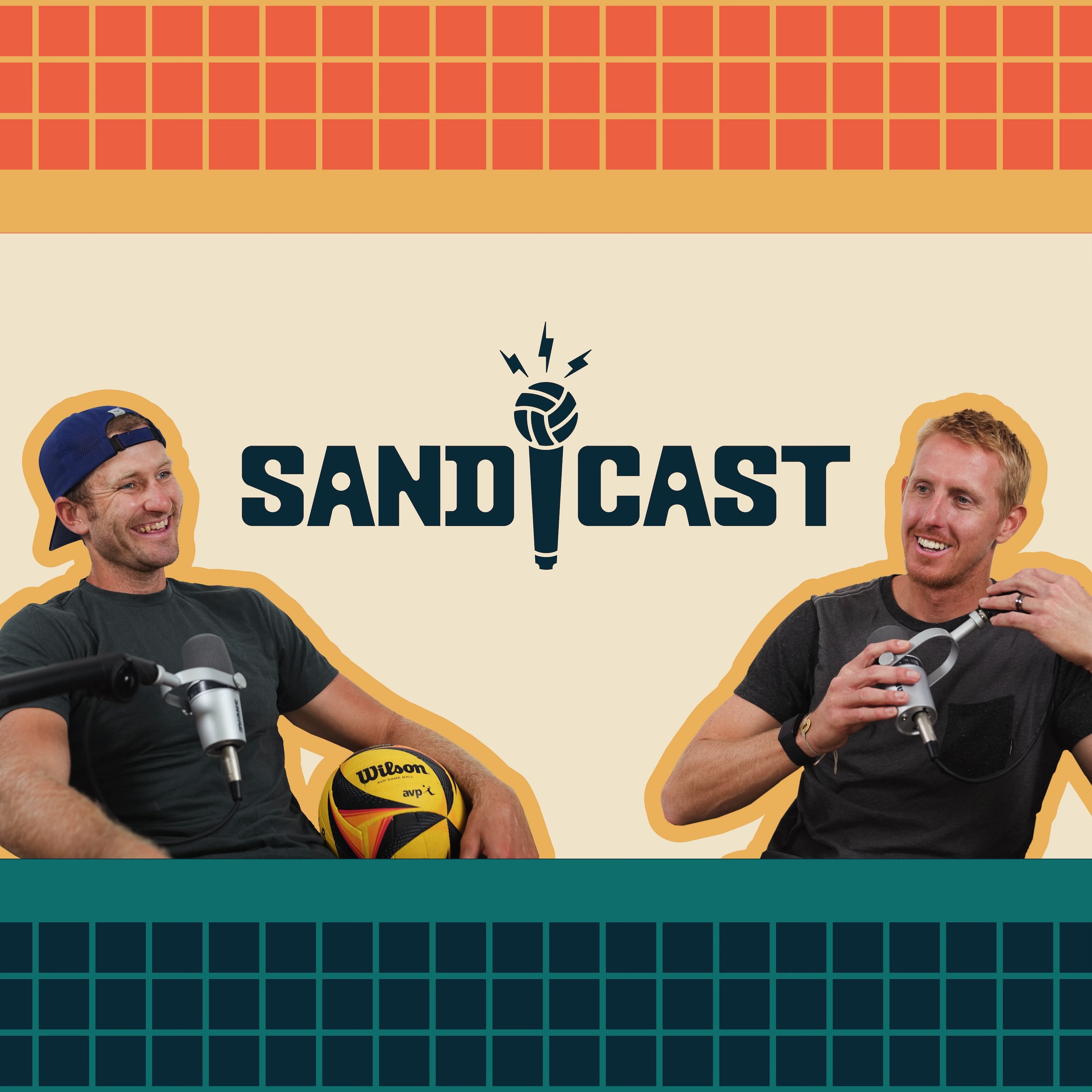
1.1M
Downloads
469
Episodes
SANDCAST is the first and leading beach volleyball podcast in the world. Hosts Tri Bourne and Travis Mewhirter take listeners into the world of the AVP, Volleyball World Beach Pro Tour and any other professional beach volleyball outlets, digging deep into the lives of the players both on and off the court as well as all of the top influencers in the game.
Episodes
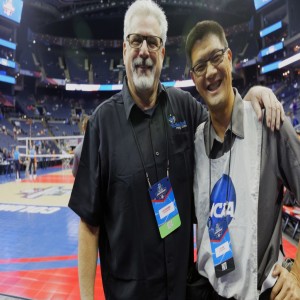
Wednesday Oct 09, 2019
Lee Feinswog and Ed Chan: 'And that's how we became publishing magnates'
Wednesday Oct 09, 2019
Wednesday Oct 09, 2019
It took a matter of weeks for Lee Feinswog to rebound from being laid off. Not a month had gone by from the moment he received a call from the higher-ups at Turner, for whom he freelanced to write college volleyball stories on NCAA.com, when he began scrolling through his phone, idea and contact in hand.
His passion for writing about the sport came as a surprise, even to him. Here was a guy who had covered LSU basketball in the Shaq days, who had written about the highest levels of the NBA, MLB, who ran in circles with some of the best writers in the country – and he was smitten by college volleyball. It’s possible that it was the novelty of it, at the time. He had watched his first men’s match only a year before, a semifinal of the NCAA Championship where, as fate would have it, he sat next to Hugh McCutcheon, then the head coach of the women’s national team and one of the most brilliant minds in the game.
“I learned more that day than you could possibly imagine,” Feinswog said on SANDCAST: Beach volleyball with Tri Bourne and Travis Mewhirter. A few days later, he found himself in Anaheim, watching the women’s team practice at the invitation of McCutcheon.
But Turner, which owned NCAA.com, was bleeding money, and the first to go were the freelancers, including Feinswog. McCutcheon, though, wasn’t the only contact Feinswog had made at that semifinal. He had also exchanged contact information with the editor at Volleyball Magazine, Aubrey Everett.
“All of a sudden, I was like, ‘Wait, I sat next to the editor of Volleyball Magazine,’” Feinswog recalled. “I sent her a note and said ‘I’m a free agent, can you use me?’
“You guys have never seen Butch Cassidy and the Sundance Kid but it’s kinda like where he goes, ‘Well, considering I’m desperate and you’re exactly what I need…’ so I picked up with the magazine and wrote for them for four, five six years as a freelance writer.”
Despite holding what was basically a monopoly over volleyball coverage, the magazine wasn’t immune to the downsizing of the journalism industry as a whole. The print edition was shrinking, circulation was down, the website was limited.
Simply put: It wasn’t going to last long.
Feinswog knew this, as did Ed Chan, who had subscribed to the magazine for more than 40 years and had been one of its most reliable freelance photographers. They agreed that, when the magazine hit a certain threshold of pain, it would be willing to sell.
They’d be the ones to buy it.
“It got to that point,” Chan said. “So I asked if they were interested in selling, and they said yes.”
It was the simplest of business negotiations, almost to comical levels. Feinswog was driving down I-10 in Houston. Chan called and said “We can buy volleyball magazine, you want to buy it?”
“Ok, sure.”
“That was it,” Feinswog said, laughing. “That was our business negotiation. And that’s how we became publishing magnates.”
He says this jokingly, but on a relative scale, Volleyball Magazine – since renamed VolleyballMag.com in Feinswog’s and Chan’s ownership of the publication – is without a doubt the most reliable and regular source of news coverage on all things volleyball, be it beach, indoors or otherwise.
Their goal was to become the daily digital news source of volleyball, which is exactly what has happened. They cover college women. They cover college men. They cover the pros, to the point that Feinswog watched every single match during the 2016 Rio Olympics.
Not just every American match.
Every match.
“And then I was like, ‘Wait, now college is about to start?’” he said.
They have covered the AVP and the NVL and the World Series of Beach Volleyball and p1440 and CBVA and every other iteration of professional volleyball there has been on the beach. They have covered the college game.
And while competitor sites such as Volleymob and FloVolley have either shrunk or folded, VolleyballMag has grown and expanded at an impressive, if not staggering, clip. The number of stories that are read through organic Google searches has exploded by 800 percent in the four years they’ve owned it. They’ve hired freelancers to cover whatever the two of them cannot, expanding to juniors and even to Brazil. It was Feinswog who named the very podcast on which he told this story.
Yes, SANDCAST: Beach volleyball with Tri Bourne and Travis Mewhirter was as much Feinswog’s creation as it was Bourne’s and Mewhirter’s.
Now a new chapter of VolleyballMag.com begins, as the magazine – “magazine” used loosely here, since there is no longer a print edition – has been acquired by p1440, equipping them with the resources they’ve long needed but haven’t possessed.
“It’s amazing really,” Chan said. “It’s kind of like making the transformation from being a garage band to getting a recording contract. We had all these ideas. We wanted to expand to juniors. We wanted to expand to Brazil. Normally we would be ‘OK, how are we going to pay for this? Who are we going to get to buy into this? How are we going to promote it?’ With p1440, if they see it as a viable idea, they greenlight it and we go with it.”
“There is a vision,” Feinswog added. “There is an expectation of greatness on a tremendous scale. All I can tell you is you’re going to see more amazing things not just on VolleyballMag.com but from p1440.”
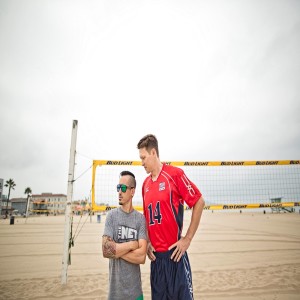
Wednesday Oct 02, 2019
Creating value with Kevin Barnett and Jeremy Roueche
Wednesday Oct 02, 2019
Wednesday Oct 02, 2019
Kevin Barnett has never been required to do just about anything he does in his current chapter of life. He doesn’t need to be out there on stadium court, swinging a homemade hammer at miniature volleyballs into a crowd of thousands. He doesn’t need to make art for the Amazon Prime set that becomes his home away from his Redondo Beach home for four months out of the year. He doesn’t need to dress up in gold and do the goofy dizzy bat skits and the shows at the technical timeouts. Just as he hasn’t needed to host a volleyball show called the Net Live on – most, as his and Jeremy Roueche’s joke goes – Mondays for the previous decade.
He hasn’t needed to do any of that, though this is only partially true.
From a work standpoint, he hasn’t. Amazon never told him to do anything, really – “I can basically do whatever I want,” Barnett said on SANDCAST: Beach volleyball with Tri Bourne and Travis Mewhirter.
But his mind did. Two-time Olympians do not simply retire onto beach chairs and Coronas. And when Barnett retired from professional volleyball in January of 2006, not by choice but by the unrelenting demands of ticked off knees, he grew restless, and fast. He and his wife, Arian, flipped roles. She put her MBA to use and went to work while Kevin watched the kids, two boys then ages two and four.
“My life,” he said, “was goldfish and sandwiches.” Which is fine, even idyllic, for a great many people. But Olympic athletes are wired differently. Their entire lives, up to that point, are predicated on solving problems, improving, beating out another guy for the spot – “suiting up with the mindset to go kill somebody,” Barnett said.
There were days he’d sit there with the boys and think “‘Bro, I used to be somebody!’” he said. “Internally, I’m like I used to do something that people valued, and now I’m like ‘What am I doing here?’ There’s one night that sticks out. I was back in my former rental house in Redondo, and there was a bunch of moving boxes back there, and the moving boxes paid for my frustrations. I don’t know what the neighbors thought. I was spiking balls on an Olympic court a year ago and now what am I doing?”
What he did was get back to work, not on anybody’s else’s terms but his own. What he did was create value where value was needed. His love for volleyball hadn’t waned; the only problem was, well, how in the world do people follow volleyball?
If Tom Brady sneezes, ESPN reports on it. But if Reid Priddy sprains an ankle and is put on the bench for a few weeks, nobody knows why.
“There was no talk between events, and on the indoor side in particular, the World League is happening every week,” Barnett said. “If you’re watching World League every week, you don’t know why the roster changes happen from one week to the next. You don’t know if somebody’s hurt. You don’t know if somebody’s trying to decide a spot. There’s no chatter.”
And so began the next season of Barnett’s life: A season of creating. He, alongside Priddy, Dan Madden, and Chris ‘Geeter’ McGee, created a show, The Net Live, which would report on all things volleyball most Mondays out of the year. Together, they brought an element of news and entertainment that volleyball had never previously enjoyed, while Barnett began honing the skill set that would become his next career – announcing, hosting, analyzing.
Creating.
“My volleyball acumen and personality gave me a shot at being an analyst,” he said. “That was a hobby, not a career.”
The Net Live, in essence, gave him the reps he needed to turn that hobby into a career. For three years, he stuck with it, adding Roueche to the team in 2011 after McGee left for a job with the Lakers and Priddy continued his professional playing career. Those reps, in part, earned him a shot at the London Olympics calling matches, which earned him a two-way with Dan Patrick, which earned him job offers as a studio host discussing high school football and a gig with ESPN.
Kevin Barnett had himself a new career, born out of creating something where there was previously a void, creating something that nobody told him he needed to do but he just did it anyway, because that’s how things get done.
“Volleyball needed it,” he said of The Net Live. “And I needed it. You have to bring value. That’s what you have to do.”
And after 10 years, The Net Live has run its course. Roueche didn’t even intend to be on the show anyway.
“I got duped,” he joked on SANDCAST. Priddy had initially asked him to be the sound guy, adding musical elements to the show, occasionally piping in with the one-liner here and there. But then Priddy left and Geeter was gone, and it was just Barnett and Roueche, a creator in his own right as the AVP’s longtime DJ, doing their thing.
“I would just make fun of people once in a while,” Roueche said. “Then they all started dropping like flies and then it was just Kevin and I.”
Though The Net Live will soon be finished, their work as partners is not. Barnett is the lead Amazon announcer for the AVP’s livestream; Roueche the DJ. It’s Roueche’s booth that Barnett retreats to when he’s not on the mic.
So they’ll continue to innovate. Barnett, after successfully implementing the whimsical Hammer Award, which earned a sponsor and became a surprising new source of revenue, is adding a Shield Award. He’ll keep decorating the sets with his own artwork, because that’s just what Barnett does: He creates value where some might not even have known it was needed.
“Whatever it is, if you’re dedicated to the process, you’ll find your space,” he said. “If you’re all in, you’ll find yourself in that industry if you want to be. Bring value. Whatever you do, bring value.”
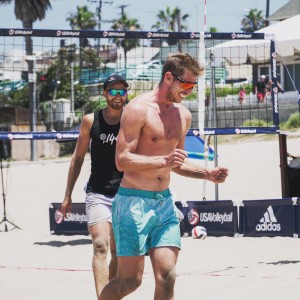
Wednesday Sep 25, 2019
NORCECA adventures with Kyle Friend
Wednesday Sep 25, 2019
Wednesday Sep 25, 2019
This SANDCAST: Beach Volleyball with Tri Bourne and Travis Mewhirter is with Kyle Friend and was recorded in Bonaire, where Friend and Mewhirter are competing in a NORCECA.
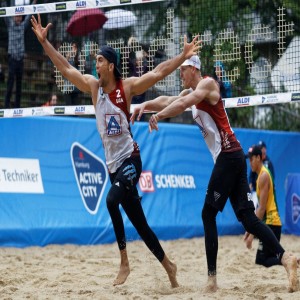
Wednesday Sep 18, 2019
Trevor Crabb: It's time to rack 'em up, tally 'em up
Wednesday Sep 18, 2019
Wednesday Sep 18, 2019
It almost seemed as if Trevor Crabb couldn’t believe what was coming out of his own mouth, when he recalled his conversation with Casey Patterson following his victory at the Manhattan Beach Open. Crabb’s first AVP win came after seven losses in AVP finals. It came after the beach volleyball world populated the hashtag #NevorTrevor, where some pushed it in their posts seriously and others just jokingly.
Everybody knew, of course, that Crabb would get his. One doesn’t simply make seven finals and lose all of the rest to come. Crabb claimed, on SANDCAST: Beach Volleyball with Tri Bourne and Travis Mewhirter, that there was no added pressure with each passing tournament and no title. What it did do, however, is build up that moment, when he sealed the seam with his right hand and blocked Patterson for the final point of his first win on tour, at the biggest beach volleyball tournament not named The Olympics, no less.
The euphoria afterwards was so high, such a rush, in fact, he told Patterson that “I almost wish it didn’t happen, because I know the feeling and what it did so I want that same feeling again. It’s all downhill from here.”
So where do we go from here, Trevor?
“Just rack ‘em up,” he said. “Tally ‘em up. Win as many as possible.”
It is funny, how that first win came. Tri Bourne had broken his hand at the Vienna Major, leaving Crabb not short of options but certainly short of his No. 1 option. He asked the AVP to allow Italian Alex Ranghieri, with whom Crabb is good friends and plays the Manhattan six-man, but they shot it down. He shot a text to Sean Rosenthal, with whom he had made the 2018 Manhattan Open finals, but that got shot down, too. Which left, of all things, a text from Rich Lambourne that went without reply.
“Priddy-Crabb on the Pier, 2019?” Lambourne asked Priddy and Crabb in a group text.
Nobody replied, though it remained in the backs of their minds. Crabb was going to reach out to Priddy before he did, so when Priddy gave Crabb the call, they were both all in. Didn’t matter if Priddy hadn’t blocked since 2017, for just a single event, or that they had never played together before, or that they had once shared some trash talk and brief rivalry.
Crabb knew they could win.
“To be honest, I knew it was definitely a possibility,” he said. “It was going to be tough to do but I knew that both of us really just wanted it bad. I’d been to the finals seven times, that was my eighth, lost all seven. Reid’s never made a final yet in his two years so we were both long overdue for that.”
That win was more than just a victory for Crabb and Priddy, but a win for the mindset they share: To be the best, you cannot specialize in one element. You must be versatile. You must, as Crabb and Priddy proved, be able to play both sides, both positions.
Basically: You just gotta get the job done, from anywhere, anytime, in any condition. And they did.
“In order to call yourself a beach volleyball player, you have to be able to side out from anywhere on the court so I kind of took that on me and focused and learned how to side out on the right side,” Crabb said. “It’s a lot more challenging than the left. You have a lot less vision, you have to rely on a lot of things first. It’s going pretty good so far. I can’t say I miss the left at all though. It’s nice to play both sides. I think that’s what separates me from someone else.”
And now the next chapter of his career begins. His AVP victory – his first, certainly not the last – is finished. Now it’s time to rack ‘em up, tally ‘em up, build ‘em up to the ultimate crescendo: The 2020 Olympic Games.
The one victory he would never wish didn’t happen.
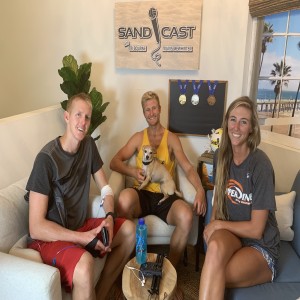
Wednesday Sep 11, 2019
Delaney Knudsen: If you can't have fun, then why are you doing it?
Wednesday Sep 11, 2019
Wednesday Sep 11, 2019
Good luck in your search. You can travel to every tournament, watch every match, pour over film for hours. Good luck finding a moment on a beach volleyball court in which Delaney Knudsen is not smiling.
She’ll pop up smiling after losing a point, because what a rally it was. She’ll smile after making an error, because sometimes errors can be funny, you know? She’ll smile after her partner makes an error, because, gosh, what a good idea it was to hit that shot.
But don’t allow that joyful demeanor to bely the competitor underneath the 1,000-watt smile and ubiquitous laugh. She’s a winner, Knudsen. Always has been, from the days she practiced with the boys team at Valencia High School to her All-American years at Pepperdine to the career year she’s currently having on the AVP Tour.
It’s just not the wins that she lives for.
“I think that if you don’t have fun playing this game, then why are you playing this game?” Knudsen said on SANDCAST: Beach Volleyball with Tri Bourne and Travis Mewhirter. “I don’t really see any other viable reason to be playing professional beach volleyball unless you have fun playing beach volleyball. There’s not enough money in it, there’s not the fame that you’re going to be recognized on the street for playing it. So if you can’t have fun, then why are you doing it? It’s been awesome to play with Katie because she gets that: If it’s not fun, then why are we doing it?”
She has a blast with Spieler, truly. And we’ll get to her in a minute, and the friendship that has blossomed out of their love for this game. But Knudsen finds the fun in everything. She’ll laugh wildly at Jess Sykora’s jump-bump kills, and the memory of playing behind Sykora in New York City last season, when they stunned Canadians Melissa Humana-Paredes and Sarah Pavan in the qualifier. She’ll beam when recalling the grit and work ethic of Emily Hartong, with whom she qualified in Seattle a few months ago.
But there is something, or dozens and dozens of things, about Spieler that Knudsen loves to her core. It makes sense, too. They grew up playing in the U.S.A. High Performance system together, every other year. They made their first main draws together, in Manhattan Beach of 2014, when they were both teenagers. They’ve got the same mindset, both on the court and off: Let this game, and life, be fun.
“Just being able to laugh and have fun and work hard, which are all my favorite parts of the game, she loves those too, so it feels super comfortable to be out there with someone who has the exact same goals as I do,” Knudsen said. “I think that just the ability to push my body and to work really hard is my favorite part. I love getting to the end of a rally where you’re sandy and you’ve grinded out and bunch of one-handed scramble plays, and win or lose, I can’t come out of a rally like that not smiling, because just working and leaving it all on the court even in just one rally is my favorite part. We come out on top of most of those because we love that pressure and love that work that kind of gets on people’s nerves.”
Spieler feels the same, too. After finishing 17th in Hermosa Beach earlier this season – a deceptively low finish, as they were the ones who sent Zana Muno and Crissy Jones, eventual semifinalists, into the contender’s bracket with a 21-14, 21-10 win – they met with their coach, who had made an interesting observation from Spieler. Last year she had taken a fifth, this year, 12 spots lower.
Yet she was unquestionably happier after this one.
“It was interesting to see what someone else could weigh in on our partnership and just the chemistry we had and just the way we played together and that I could kind of help foster that enjoyment of the game for her just as she was doing for me,” Knudsen said. “I would not have expected that we would have finished the season together but couldn’t be any happier that we are.”
No, it was not the initial plan to finish as a left-side blocker. For the majority of her professional and college career, Knudsen has been a defender. While she’s always been adept at switching sides, she played on the right for most of 2018 with Sykora. Then came Spieler’s call to play Hermosa, and suddenly Knudsen was taking on a new position, a new side, and a style of play that can only be described as grind the other team into the ground.
And then laugh about it.
“If you would have told me I would have ended this season as a blocker I probably would have laughed and been really embarrassed because I don’t really consider myself to be a strong blocker,” said Knudsen, who finished AVP Chicago ranked second among all blockers in blocks per set. “I wouldn’t do it any other way, getting the opportunity to play with Katie and grow my game in such a unique way has been an incredible experience.”
As much as she’s enjoyed the physical learning curve as a blocker, competing with a new but old partner, Knudsen is particularly enamored with the mental strides she’s made, and is making.
“We can be down three points at the end of a set and I’m not worried, because [Katie] wins,” Knudsen said. “She makes those plays at the end and it’s been really cool to learn from her and adapt that into my own game, to know have that internal confidence. People say it all the time: ‘You’re never out of the game, lotta game left, that’s why we play’ but it’s all just words until you feel it. And playing with Katie I’ve been able to feel what that feels like and it’s been incredible.”
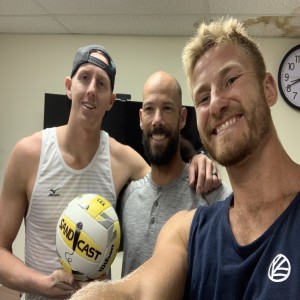
Wednesday Sep 04, 2019
Reid Priddy is going for "double-black belt status"
Wednesday Sep 04, 2019
Wednesday Sep 04, 2019
Two years ago, maybe it would have worked. Maybe, when Miles Evans put a ball away, looked directly at Reid Priddy and Trevor Crabb, flexed and yelled with everything he had, “C’mon!” it would have done the trick. Thrown Priddy off.
It had worked two years ago, from the guy who was now on the same side of the net as him. Crabb, in the semifinals of the Manhattan Beach Open, had famously run his mouth. It did a number on Priddy, then, though he couldn’t fully understand why. He didn’t understand where all that talk was coming from.
Hadn’t all their previous interactions been cordial? Polite? Even friendly? Priddy didn’t know, at the time, that was just what Crabb does on the court. He talks trash. Doesn’t matter if you’re out of the qualifier or out of four quads with the indoor national team: You’re going to hear him.
Afterwards, Priddy broke it down.
“‘Why was I so mad?’” he wondered.
“And it was ‘Well, he showed you disrespect,’” Priddy recalled on SANDCAST: Beach Volleyball with Tri Bourne and Travis Mewhirter. “But why should I have the expectation that somebody should respect me? So it was almost really great because I let go of that expectation at all, even if I subconsciously had it. It was probably that moment, that interchange, that I let it all go.”
So when Evans buried the ball to close out the first set, and piled a little talk on top of it, Priddy didn’t mind. He’d been there before. He’d learned from it. And then he gave it right back.
“From that moment on,” Priddy said, “it was just ‘All right, now we’re in it. Let’s battle.’”
Let’s battle. If there are two words that could accurately summarize the mindset of William Reid Priddy for these past 41 years, those may be the ones to do it. He’s a self-proclaimed underdog story, but unlike a number of athletes who like to push that sometimes-false narrative, his is rather genuine. Raised on a steady diet of soccer, Priddy is the son of Ken and Sharon Priddy, who thought it was funny that, after 11 years of soccer, Priddy was going to try volleyball.
“They were like, ‘All right, we’ll just come watch. We have nothing to offer,’” Priddy said. He was athletic enough to help Mountain Pointe High in Phoenix, Arizona, to the school’s first state title, in 1995. Still, the sport was so new to the state, in just its second year as a varsity sport, that Priddy was no blue-chip prospect or can’t-miss recruit. He was still the blue-collar kid who had played mostly soccer his entire life.
It was enough, however, for LMU to offer him a spot on a team that recruited seven outside hitters and hadn’t yet developed a single All-American.
In 2000, Priddy would become that All-American. Years later, after the program was shuttered, he’d become the first volleyball player to enter the LMU Hall of Fame.
That was, in the grand scheme of his career, the easy part. At 6-foot-4, even by the standards of the early 2000s, he was undersized for an outside. Now he was set not to compete against of diamonds in the rough at LMU, but against the best in the country for a spot on the national team. It is that exact environment, though, where the kid who wasn’t the biggest, the one relegated to the “sandlot teams” growing up, the one who only got in fights with bullies because he just couldn’t see the bigger kids picking on the smaller ones, thrives.
He didn’t spurn the odds but embraced them, clutched them to his chest.
“Nobody ever looked at me and was like ‘That guy’s going to be great.’ I was never the blue-chip guy,” Priddy said. “Now I purposefully channel that. A lot of us, we could have these mental lapses of confidence, ‘Oh man, can I do this?’ Once I learned to channel the competitiveness, how I felt about myself was no longer relevant, because a job had to be done, I gotta put this ball away.”
Oh, he would put balls away, all right. For 16 years, he’d represent the United States. He’d play in four Olympics, win a gold and a bronze. His tenure with Zenit-Kazan would be so wildly successful, in fact, that it almost felt weird, how expected it was to win.
“That was a strange feeling,” he said. It went against everything his underdog upraising had fostered.
If the expectation was to win then where did the satisfaction come from? It seemed, at times, that there was no real reward: Win and it’s what you were supposed to do; lose and what just happened?
He’s not a fan of expectations, Priddy. Steals not only a lot of the joy of playing this game but from the purpose of it all.
“I have tremendous self-belief but I don’t like expectations,” he said. “In my best years in indoor, my mental routine was do whatever I wanted to do. We could play cards on the bus and we’d be betting but there was always a moment in the locker room where it was ‘Ok, now it’s go time.’
“The shift that took place when my generation came in and with all of our coaches, it was very focused. We’re here, so let’s be here. All in. I really love that stuff.”
But expectations, from the outside, anyway, are inevitable when one has had the success Priddy has enjoyed.
Unless, of course, you switch sports. Change settings. Do something totally radical that nobody could have ever expected him to really make the Tokyo Olympics on a different surface, right?
That, in a way, is what happened when, in 2017, Priddy took to the beach.
Hacking the beach. That’s what Priddy called his strategy to transfer his indoor skillset to the beach. He gently kicks himself for the name now. He never meant it to imply there were shortcuts to success in the beach game, but optimizations.
How could he make those proverbial 10,000 hours as efficient and effective as possible, so as to rapidly expedite the improvement of his skillset to the point that Tokyo 2020 really wasn’t out of the question?
He brought an entirely new developmental strategy to the beach. He had statisticians at practice, charting serves, both location and speed. He had trainers. He had coaches ranging from Marcio Sicoli to Rich Lambourne. He fostered a community in Huntington Beach, where the training was no longer separate, just a bunch of teams meeting and winging it, to a full-on program of hundreds of reps in a compact, 90-minute training session, where teams weren’t pitted against one another, but worked alongside one another.
“There’s no shortcuts to skill acquisition,” he said. Which is how, after two years of reps reps reps reps reps, he found himself down one set to none to Evans and Doherty at the Manhattan Beach Open. A loss would leave him and Crabb in ninth. But this wasn’t the Priddy Evans would have faced two years prior. This was a different Priddy, one who had grown in abundance from the previous edition.
“I have no expectation of how people should treat me, how they should interact with me,” he said. “I don’t feel 41 in my brain, I don’t feel like a gold medalist. I don’t go into matches thinking ‘Oh, I’m a gold medalist.’ I’m super aware of my deficiencies.”
Which is why he’s able to shore them up so quickly. And with each match, those deficiencies became harder and harder to find. They came back to beat Evans and Doherty, 15-13 in the third set. Then they knocked out Tim Bomgren and Troy Field, Phil Dalhausser and Nick Lucena, and, in the finals, Chase Budinger and Casey Patterson.
In winning the Manhattan Beach Open, Priddy hadn’t hacked the beach. He had simply out-worked a lot of people on it. No learning opportunities went to waste, something he refers to as “double-black belt status.”
“When I think about volleyball, and anything, I like to channel martial arts,” he said. “The sensei did not get there thinking ‘I’m 21-0.’ Martial artists, it’s about proficiency. It’s about competence. The way I like to look at it is: ‘Here’s my end goal. This is what I think is possible for me as a player or us as a team. What are the behaviors to display, what are the feathers I need in my cap to be that player?’
“And then you work towards that. It’s kind of like a street fight. Now you’re in Manhattan, you’re playing in a match, you are who you are. It’s not like being 1-0 or 0-1 has somehow changed your proficiency, so it’s always about trying to level up to the next level. That comes not from wins and losses, you can learn from both, but it comes from ‘How good can you guys get as a team?’ That’s what’s important. It’s hard to do that when it’s your profession. I want to get to that double-black belt status.”
Not that Jose Loiola would ever let him think he has that. No, the coach of Priddy and Crabb during Manhattan Beach had them back on the sand two days later. He wasn’t full of congratulations. He didn’t take it easy.
“Nobody cares,” he told them.
Priddy loved it.
“The ultimate is when you can win but you treat wins as losses,” he said. “When you can take just as much from a win as from a loss, to me, that’s double black-belt, like legendary status. I think that’s the goal for all of us. How can we not let all of the little things go just because we won? Once that little euphoria dies down and we think we’re on top of the world, how can we look back and say ‘I could have done this better.’”
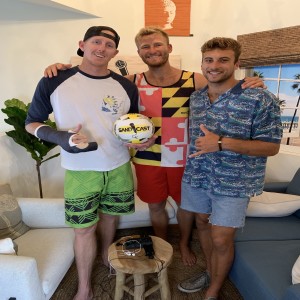
Wednesday Aug 28, 2019
Eric Beranek: Setback, setback, setback -- then massive breakthrough
Wednesday Aug 28, 2019
Wednesday Aug 28, 2019
You know what they say about plans. Some say that when God hears you making plans, he just laughs. Mike Tyson claims that everybody’s got plan, until they get punched in the face.
Eric Beranek had plans this year. He was going to get a coach. Play the year with one guy. Do it the right way, finally.
Then God chuckled, and Beranek was, proverbially, punched in the face. He began the year well enough, with Curt Toppel. Straight into main draw. But Toppel was, well, “Toppel,” Beranek said on SANDCAST: Beach Volleyball with Tri Bourne and Travis Mewhirter. He said this with a laugh, because Toppel is Toppel. Full-time job. Kids. Just had enough points to make main draw, so why not go out and play?
Beranek knew, though, that Toppel wasn’t his full-time guy. Wasn’t into it like he was. So he turned to Marty Lorenz. That, too, went well enough at first. They made main draw in Austin. Played well, too. Only thing was, Beranek had a cyst on his tailbone. Didn’t tell anyone but shew wee, you should have seen that thing. Went to the hospital right after he got home, and the surgery seemed to go ok, until, an hour later, he was sitting in the bathroom, body rejecting everything, plunging into septic shock.
He spent a few more days in the hospital. Had to skip New York, and then Seattle, though the latter turned out to be a bit serendipitous. When Lorenz called Beranek to tell him he couldn’t play Seattle, Billy Kolinske phoned no more than two minutes later, asked him to play the Pottstown Rumble, a big money grass tournament just south of Philadelphia.
“I still wasn’t quite right,” he said, but he went anyway, and wouldn’t you know it, they made the finals. Won a good bit of cash, too. Maybe this year was looking up. Going to turn around, close on a high.
Somewhere, God laughed.
Maybe he knew Beranek was about to get punched in the face again.
The day before AVP Hermosa, where he was set to partner with Lorenz again, Beranek’s girlfriend broke up with him. Then salt was poured in by Dylan Maarek and Dave Palm, who knocked him out of the final round of the qualifier.
“I didn’t play two AVPs, don’t qualify, girlfriend breaks up with me, ‘I’m like, awesome! We’re back. All time low. Sweet!’” Beranek said, laughing. That’s the things about slamming into the bottom: You bounce.
And he did. He set up a practice with Corey Glave, just the two of them. He told Beranek that the player he once knew only wanted to win. He needed to become the player who expected to win.
“You gotta find that, and you gotta work super hard to get back,” he told him.
“Ok,” Beranek said. “Here we go.”
Here we go meant eighth seed in the AVP Manhattan Beach qualifier. No longer with Lorenz, Beranek was back with Kolinske, his Pottstown partner. Lorenz almost encouraged the move. He had trouble dialing in Beranek’s set in transition. Kolinske, who’s world-class at the art of transition setting, would be a better partner for him.
That’s one plan God didn’t laugh at.
Beranek was finished, for the weekend, at least, getting metaphorically punched in the face. They qualified, and then, after dropping their first match to Ed Ratledge and Rafu Rodriguez, they battled back to win a three-setter over Travis Mewhirter and Raffe Paulis. Their legs were toast. Didn’t matter. They rallied, one more time that day, to beat John Hyden and Theo Brunner. With six matches on their legs, they were moving onto Saturday.
“Holy shit,” Beranek thought. “This tournament just started.”
It would have been funny, for anyone in the stands, to see Beranek’s dad there. He’s made quite the turnaround. He’s his biggest fan now, Mr. Beranek, but a few years ago, to imagine his son competing on a Saturday at the AVP Manhattan Beach Open? No way.
He’s got his own Aerospace manufacturing business. His son was set for life. Didn’t matter if he had dropped out of OCC, dismayed by grades and volleyball. Eric had a job.
“You’re set!” he pleaded with his headstrong kid. His friends weren’t much different. When Beranek told them he wanted to play beach volleyball professionally, “they looked at me like I was crazy,” he said. “They said ‘Ohhh, you want to be an actor too? You probably have a better shot at that.’ That was a funny and weird thing I struggled with.”
So his friends would laugh, and his dad would send his daily offer: Want me to help pay for trade school? Stay in the shop? Want to be a hairdresser?
Nope nope nope.
He may have dropped out of OCC, but he had his own kind of education in mind. He skipped work one day and biked down to the strand to find Holly McPeak. He asked if she knew of any coaching opportunities available, and she said no, but there’s this guy, always dressed in Pepperdine gear. Name’s Marcio Sicoli. He’d be down at 15th street tomorrow morning. Go find him. So he skipped work again, found Sicoli, and for the next four months, became the world’s most dedicated ball shagger. From 8-10, he’d be with Kerri Walsh Jennings and April Ross, and from 10-12 he’d work with Kolinske and Casey Jennings.
He took the work he saw them doing and applied it to his own game. The results, as they do, lagged at first. Took their time to come in. But a main draw in Seattle of 2018 led to Hermosa, and Manhattan, and Chicago.
And then he made plans for the 2019 season, which is when everything began to dissolve – crystallizing only when Kolinske, in a poetic reunion, needed a partner. Then came Manhattan, qualifying, stunning one team after the next: Hyden and Brunner, Avery Drost and Chase Frishman, Ricardo Santos and Sean Rosenthal, Chaim Schalk and Jeremy Casebeer.
And now they were in the semifinals?
Eric Beranek?
The kid who had to trick his way onto the court at OCC, telling the starter that the coach wanted him in instead, only for the coach to notice, one play in, and yank him again?
That kid?
Oh, yes. He had made the switch Glave wanted. Eric Beranek expected to win.
“It was ‘We need to win. How are we going to win?’” Beranek said. “We were playing good ball. I’m playing good volleyball against these guys. We can beat them.”
He’s able to sit back, relax now. Now that the legs aren’t feeling like jello and the adrenaline has reduced his heart rate to somewhat normal. He didn’t know when his time would come, only that it would.
He simply had to be ready.
“Everyone’s timeline is different,” he said. “Some people will say ‘I’m this age, so I should be doing this at this age because he is,’ but there is a lot of those pressures and I think it’s easy for younger guys, girls, to look up to people, the superstars who come out of college and are placing super high. There’s a lot of that. There are girls my age that are in contention to winning tournaments. I thought ‘Man, when is that going to come? Am I going to be 25? 26?’
“I didn’t really know, and I didn’t put too much pressure on myself to do that. I just said it’s going to come when it’s going to come. Everyone has their own timeline, so I’m just going to keep grinding.”
Keep grinding.
The one plan God doesn’t laugh at.
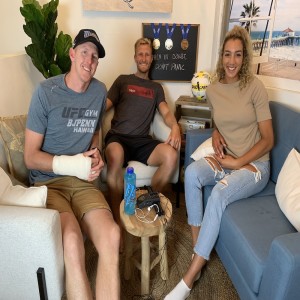
Wednesday Aug 21, 2019
Brandie Wilkerson: 'The next thing you know, your goal is the Olympics'
Wednesday Aug 21, 2019
Wednesday Aug 21, 2019
In 2016, Brandie Wilkerson saw everything there was to see, up close and in person. She saw the ceremonies. The athletes, both beach volleyball and otherwise. She practiced on stadium court with the women. She practiced against the men. An alternate for the 2016 Rio Games with Melissa Humana-Paredes, she did just about everything all of the other beach players were there to do, save for compete and one other element of being a participant of the Olympic Games.
She didn’t go to the Athletes Village.
Not yet.
“A part of me didn’t want to stay in the village, because I wanted to earn it,” Wilkerson said on SANDCAST: Beach Volleyball with Tri Bourne and Travis Mewhirter. “So I was like ‘I’m going to get there myself one day.’”
Get there herself? Wasn’t this the 24-year-old who had only picked up beach volleyball less than five years ago? The one who was almost as likely to play rugby in college as she was volleyball? Anybody who hadn’t yet heard of Wilkerson may have been able to take that comment and shelve it into the legions of other players who make similar proclamations but don’t follow up. Yet this was not an athlete who belongs in a class of anyone else.
Brandie Wilkerson is a class of her own.
This was the daughter of Herb and Stephanie Wilkerson, the former an NBA draft pick of the Cleveland Cavaliers and, the latter a runner for Switzerland. A five-sport athlete in high school, winner of four volleyball championships and one in rugby.
What would be one more sport for her?
Actually, it was, shockingly, to Wilkerson, a bit difficult, though that only raised the appeal. For so long, sports had come so easy. Here was one that presented a worthy challenge.
“Playing beach, it was ‘Whoa, there’s a lot more going on here,’” Wilkerson said. “I was attracted to that challenge, and with any competitive athlete, you just want to prove to yourself that you can do it.”
She hit the NORCECAs first, 19 in all from 2013-2016, adding 15 FIVBs, making seven main draws.
And then the breakthrough.
The team for whom her and Humana-Paredes had been the alternates in Rio, Sarah Pavan and Heather Bansley, split. Pavan grabbed Humana-Paredes. Bansley, who had been named the best defender in the world, scooped Wilkerson.
Gone were the qualifiers and in was an entire season of top-10 finishes, including a fifth at the Vienna Major. Her prize money tripled, her world ranking improving 90 spots, to 20th.
“I just kept raising the bar and I looked up and it’s ‘Oh, I’m doing this full-time right now.’ I was pretty surprised two years ago, when I was stable, I never thought I would be here, and that’s kind of my whole theme with beach volleyball is that I never pictured myself here,” Wilkerson said. “I just knew I wanted to challenge myself and accomplish a goal and it was little goal, little goal, little goal, and the next thing you know, your goal is the Olympics, and it’s like ‘When did we get here?’”
By the end of 2018, her and Bansley would be ranked No. 1 in the world. They’d win tournaments in Itapema, San Jose, Las Vegas, Chetumal. Wilkerson would be named the best blocker in the world.
Suddenly a goal of reaching the Olympics that could have seemed like a stretch at first now looks more like an inevitability.
“I feel extremely blessed,” she said. “I’ve had times where I was debating switching countries because it’s so difficult to be successful in Canada and I had so many other interests I could make a living doing. I wanted to impact the environment, and I can’t do that just playing sports. But I feel like if I have an opportunity to be young and physical and have those chances so many people don’t, I’d be silly to give it up and grow old doing the other things.”
There’s only one way into the Athletes’ Village, after all, and it isn’t by doing other things. But still, there is work to be done, an entire season to be played before Tokyo 2020.
“I haven’t proven myself consistently, which I think is really the epitome of being the best,” she said. “I think I can get there, and that’s my goal. Watching these people dominate and seeing that it can be done, it’s like ‘Well I want to do that.’”
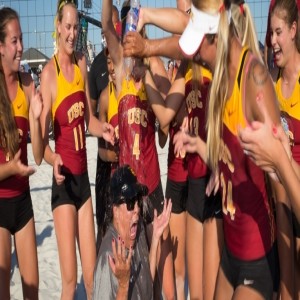
Wednesday Aug 14, 2019
Anna Collier: The Coaching Legend who's now a 'teenager with money'
Wednesday Aug 14, 2019
Wednesday Aug 14, 2019
Anna Collier is sitting on Tri Bourne’s couch, and she is – if you can believe it – relaxed. She hasn’t been to the beach in months, aside from when she rides her bike down the strand. She’s getting facials, going to the spa. Reconnecting with old friends. Getting fit.
“Just call me Soccer Mom Anna Collier,” she said on SANDCAST: Beach Volleyball with Tri Bourne and Travis Mewhirter.
For anyone who knows, or has known, Collier, this is a near-impossible thing to imagine. For the past four decades, Collier hasn’t had time for facials. Trips to the spa.
Relax?
How can you relax when your day job, for just shy of 40 years, included acting as the Athletic Director, compliance office and volleyball coach at Santa Monica College? Most coaches take the summers off, do they? Not Collier. That was for FIVB, for AVP, for juniors. Non-stop the coaching cycle went, around and around and around.
Until, on June 6, it came to a halt. Collier announced her retirement from USC, where she had built not only a beach program, the first of its kind, but had played an integral role in building beach volleyball as a sport at the collegiate level.
“It was time,” she said.
There is never any one reason for such a monumental decision in one’s life. But as those reasons accumulate over the course of 40-plus years, sometimes it takes one gentle nudge, from a former protégé, to tip you over the edge. That came, in part, from Misty May-Treanor, whom Collier had once coached.
“When,” May-Treanor wondered, “are you going to have won enough?”
On Collier’s fingers, figuratively, were seven National Championship rings at USC. On her resume were 206 wins and only 38 losses at SC. To her name is virtually every coaching record one can imagine: 62 consecutive wins, an NCAA recore; two-time Coach of the Year; first head coach to reach 100 wins, and 150, and 200. Enough victories over rival UCLA for the rest of the university to be happy.
The more Collier thought about it, the easier it became for her to admit, both to herself and to the public, that “it’s time.”
And for the first time in as long as she could remember, she slept like a rock. No longer was her mind whirring over recruiting – Who to call, when to call them, who to look for – or how she could tinker with this lineup or that partnership.
Her biggest decision, suddenly, was: “Do I take my bike this way, or that way?”
And she loves it.
“I haven’t had a summer off in a long time,” she said. “This is literally the first summer I’ve had off in four decades.”
What she leaves behind is a legacy and coaching epoch that will be labeled as iconic. She, alongside similarly Hall of Fame caliber coaches such as Nina Matthies at Pepperdine, helped usher in an entirely new era of beach volleyball, growing the college game into the fastest growing sport in NCAA history.
And it all began with crashing a golf cart.
In 2013, Sara Hughes was one of the best indoor players in the country. A four-year starter at Mater Dei, an athletics powerhouse in Santa Ana, Hughes was named team MVP in three consecutive seasons, the Female Athlete of the Year. All-American. All-League. All-Everything.
And Anna Collier had a shot.
Hughes had grown up playing sand in Huntington Beach. When she was touring schools, she made a firm rule that it needed to have a beach program, which less than 20 in the country did when she was making her decision.
USC had launched its program in 2012, with only one scholarship athlete, Geena Urango. Collier had no idea if she could even offer any others, but this was Sara Hughes. She’d find a way. There was only one problem: Her recruiting trip was a complete disaster.
Collier loaded up Hughes and her father, Rory, in then-indoor coach Mick Haley’s golf cart, and off they went, driving around campus, which Collier was hardly any more familiar with than Hughes was. She was still working at Santa Monica College at the time, and hadn’t had much availability to learn USC’s campus outside of anything volleyball related.
So they toured, and Collier “just made stuff up,” about the buildings, making a mental footnote to actually learn a thing or two. But she can’t make up the next part, about Collier coming to a structure of arches on campus – and crashing the golf cart directly into them.
“She walks out the door and I look to my assistant and I’m like ‘We’ll never see her again. That’s it. We’re done,’” Collier said. She’s able to laugh about it now, because, as you know by this point, Hughes became a Trojan, launching one of the most dominant four years in all of college sports.
And it wasn’t just Hughes. With five more scholarships than had been originally budgeted, a rapid increase thanks to “an anonymous tip,” Collier said, laughing a surreptitious laugh, she locked in Kelly Claes, Allie Wheeler, Nicolette Martin.
Born was the indomitable power that would become USC beach volleyball.
Now that power is in the hands of Dain Blanton, who coached under Collier for four seasons as the volunteer assistant. Collier knows USC is in good hands. Blanton’s the right man for the job.
As for her?
She’s already had requests to coach at the professional level. Her answer every time: I’m not doing anything. Not this summer, at least. She’s enjoying the Summer of Anna Collier. She likes being Soccer Mom Anna Collier, where she gets to wake up and wonder: Do I go left on the strand, or right?
For the first time in more than 40 years, it really doesn’t matter.
“This,” she said, “is sweet.”
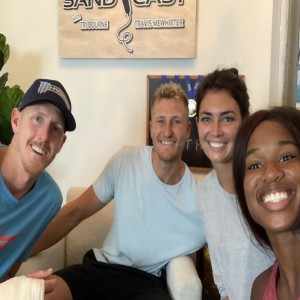
Wednesday Aug 07, 2019
Zana Muno and Crissy Jones: The 47 seed who crashed AVP Hermosa
Wednesday Aug 07, 2019
Wednesday Aug 07, 2019
It almost didn’t happen. The Cinderella run. The upsets over the 16, the four, the eight, the 22. The AVP semifinal that would be host to the highest seed – Q47 – in the tour’s history. The 8-3 jump Zana Muno and Crissy Jones would get on top-seeded Betsi Flint and Emily Day, on stadium court, on Sunday.
All of that was nearly lost before any of it even got started.
Towards the end of Jones’ and Muno’s fourth and final qualifier match for AVP Hermosa, Jones felt a cramp coming on, compiled by an awkward landing on her knee. They finished the match, of course. By that point, they’d come to far not to, and it was over quickly enough: 21-13, 21-7 over Lara Dykstra and Kim Smith, who were battling through injuries of their own.
In that moment, they had done everything they had come to do. They qualified on the AVP Tour, something that eluded them in their only other professional event, in Seattle, where they fell in the third round to Janelle Allen and Kerri Schuh.
They cried on the way home to the airport that weekend.
“At the same time,” Jones said, “we were both really unsure with what we were capable of doing.”
Both of them had proven more than talented enough indoors – Muno at UCLA, Jones at Washington -- to command a contract, with a salary, validation, stability, overseas. Their beach journey, at that point, had been the exact antithesis. Twice they had bought flights, booked hotels for qualifiers. Twice, in Austin and then New York, they didn’t get into the qualifier because of a lack of points.
“I was like ‘Oh my God, this is so hard,’” Muno said, laughing.
She’s able to laugh now, in retrospect. It’s easier to look in the rearview and smile when there’s a third place in that same rearview.
They drew lessons from each, Seattle in particular. For four years at UCLA, Muno had been the favorite in virtually every match she played, finishing a brilliant career with two national championships, scoring the final point of the match that would seal the second. Now the role was flipped: Muno and Jones, a standout on court one at Cal Poly, which also enjoyed a historic season, were the underdogs, a role they embraced.
“We came into Hermosa and said ‘Ok, this is our time to attack it and we’re going to go through a qualifier again and just stay present with every match we played,’” Jones said.
So when they qualified, and there would be no teary exits, that was it.
“Once you’re out of the qualifier you can breathe, you’re so free,” Muno said. “Once you’re in the main draw, now you have nothing to lose, you can play free.”
Problem was: They almost didn’t play at all. Jones called Muno on their way to the site, told her that her knee was hurting pretty bad. She might not be able to do it. Muno, on the other end of the phone, put on a supportive look: “I’m like, ‘It’s ok, you gotta take care of yourself,’” she said, laughing – always laughing – again.
Meanwhile: “I’m sobbing.”
They figured they’d give it a try anyway. They told AVP tournament director Jeff Conover to pull them off of stadium court. Nobody wants to see a mid-match forfeit. So he put them on court five, and against Katie Spieler and Delaney Knudsen, a team they had beaten weeks earlier in the Santa Barbara Open, they lost 21-14, 21-10.
It was the best thing that could have happened.
In a 24-team draw, as Hermosa is, if you win your first round, you play almost immediately after. But if you win your first and lose your second, on minimal rest, you wind up in the exact same spot as if you had lost your first. So instead of playing a second match on hardly any rest, Muno and Jones were able to take six, seven hours off their feet. Put the legs up. Recover, finally.
And then, match by match, the story of the weekend was written: a 15-10 third-set win over fellow collegians Morgan Martin (Hawai’i) and Iya Lindahl (Cal), a sweep of Meghan Mannari and Taylor Nyquist, another sweep of Brittany Hochevar and Maria Clara Salgado, a three-set win over Kim DiCello and Kelly Reeves, a thrilling three-set quarterfinal over wunderkinds Delaynie Maple and Megan Kraft.
With each win, Jones would wonder to herself, “Is this really happening?”
“I think the experience in general, because it was so unexpected, and because of all the adversity we had gone through to get there, we were so grateful for everything that happened and seeing all these people who had been kicking butt on tour, just giving it our best shot,” Jones said.
They did that Sunday, too, but in their eleventh match, their legs finally gave in. The 8-3 lead they established on Flint and Day was flipped into a 14-21 loss. A valiant comeback in the second was thwarted. Flint and Day would go on to win. Muno would call her brother, JJ, a minor league baseball player who is currently in the Chicago White Sox system.
He asked her what happened, and she said her legs just didn’t have anything left in the tank, a feeling he’s more than familiar with.
Next week, though, in Manhattan Beach, they’ll have four less matches on their legs. After winning an AVP Next Gold Series in Colorado, they earned a direct main draw berth. Next week, too, they’ll have something they didn’t before: Validation. The confirmation that, yes, they can do this.
They can compete with the players by whom they’re still star-struck. More than that: They can beat them.
“We knew that when we got the opportunity we could hang and play with the best of them,” Muno said. “I think we just needed the opportunity. We were just trying to be as prepared as we could for [Manhattan] and our breakthrough came a little sooner than we expected.”